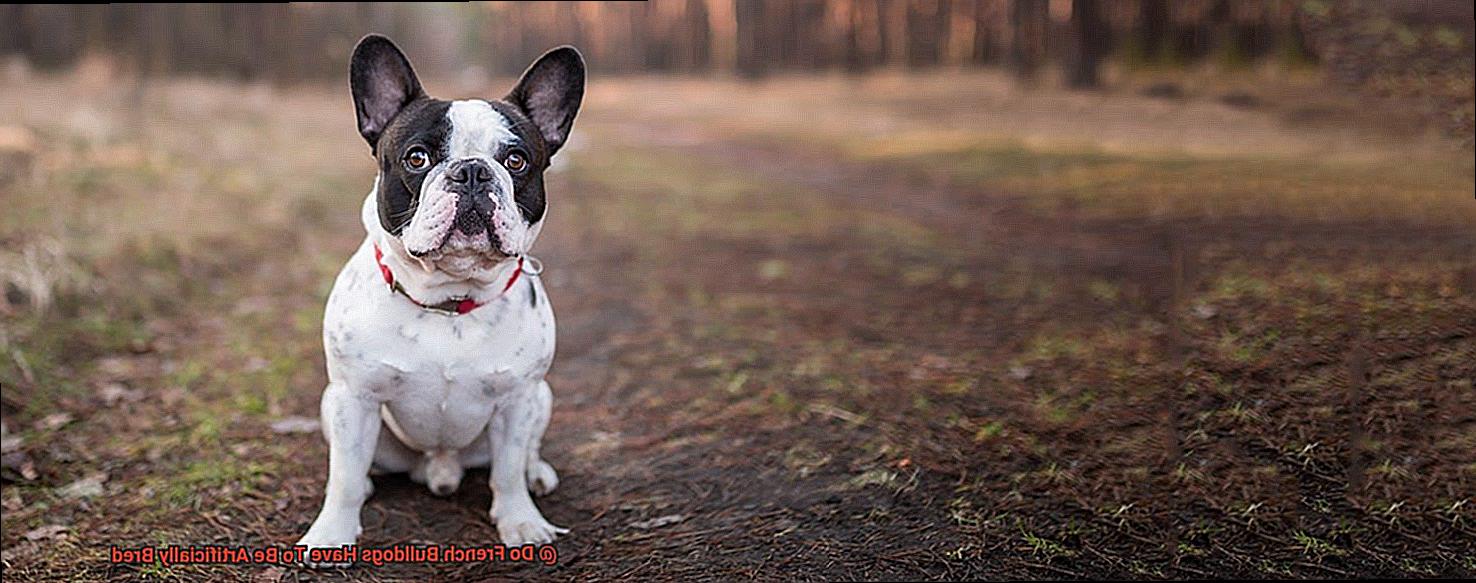Do French Bulldogs Have To Be Artificially Bred?
Are French Bulldogs the product of careful planning or just a twist of fate? This question has sparked quite the debate among dog breeders. Some argue that French Bulldogs must be artificially bred, while others believe they can reproduce naturally. So, let’s dive into the world of French Bulldog breeding and uncover the truth.
Artificial breeding, also known as artificial insemination, has become a popular practice in French Bulldog breeding. Why? Well, these little guys have a unique body structure with a big head and narrow hips, making natural mating a bit tricky. Plus, their short snouts and respiratory issues can complicate things even more. But fear not. With artificial insemination, breeders can overcome these challenges and ensure successful reproduction.
But that’s not all. Artificial breeding also allows breeders to expand the gene pool and reduce the risk of genetic disorders. French Bulldogs are prone to health problems like breathing difficulties, joint issues, and eye conditions. By carefully selecting suitable mates and using artificial insemination, breeders can minimize the chances of passing these problems onto their pups.
Of course, there are critics who argue that relying too heavily on artificial breeding can harm the breed in the long run. They claim that focusing so intensely on specific physical traits – like those adorable flat faces – has led to an increase in health problems. The limited gene pool resulting from artificial breeding may worsen these issues and limit overall genetic diversity.
In conclusion, while French Bulldogs can technically reproduce naturally, artificial breeding has become prevalent due to their unique characteristics and health concerns. It helps breeders overcome physical obstacles, broaden the gene pool, and reduce the risk of passing on genetic disorders. However, it’s crucial for breeders to strike a balance between preserving those distinctive features we love and prioritizing the overall health and well-being of our beloved furry friends.
The Unique Physical Characteristics of French Bulldogs
Contents
- 1 The Unique Physical Characteristics of French Bulldogs
- 2 The High Demand for French Bulldogs
- 3 Health Issues and Genetic Disorders in French Bulldogs
- 4 Is Artificial Breeding Necessary for French Bulldogs?
- 5 Natural Mating as an Alternative to Artificial Breeding
- 6 Pros and Cons of Artificial Breeding for French Bulldogs
- 7 Ethical Considerations of Artificial Breeding Practices
- 8 Responsible Breeding Practices for French Bulldogs
- 9 Conclusion
In this comprehensive guide, we will dive into the unique physical characteristics that make French Bulldogs stand out from the crowd. From their muscular bodies to their bat-like ears, we will explore every charming detail that makes these dogs so adorable.
Compact and Muscular Body Structure:
French Bulldogs are known for their sturdy build, with a deep chest, broad shoulders, and a thick neck. Despite their small size, they possess a surprising amount of strength and agility, which adds to their overall charm.
Large and Expressive Eyes:
Their round eyes, set wide apart, are one of the most captivating features of French Bulldogs. These dark and expressive eyes give them an irresistible and lovable expression, making it impossible to resist their charms.

Smushed Face and Wrinkled Forehead:
French Bulldogs’ flat and wide skull, combined with a short and broad muzzle, creates their signature “smushed” face appearance. This unique facial structure is accompanied by wrinkles on their forehead, adding to their adorable appeal.
Bat-Like Ears:
The erect ears of French Bulldogs are wide at the base and rounded at the tips, resembling those of a bat. These ears contribute to their alert and attentive expression, making them even more endearing.
Short and Dense Coat:
French Bulldogs have a low-maintenance short coat that is smooth and dense. Their coat comes in various colors and patterns, including brindle, fawn, pied, and black. Grooming requirements are minimal, perfect for those looking for a low-maintenance companion.
Size:
French Bulldogs are considered a small breed, standing at about 11 to 12 inches tall at the shoulder and weighing between 16 to 28 pounds. Their compact size makes them well-suited for apartment living or homes with limited space.
Tailless or Short-Tailed Appearance:
French Bulldogs typically have a naturally occurring short and straight tail. However, some individuals may have longer or curly tails due to genetic variations. Regardless of the tail length, their wagging tails always express joy and excitement.
The High Demand for French Bulldogs
French Bulldogs have taken the world by storm, captivating dog lovers with their adorable appearance and lovable nature. In this blog post, we will explore the factors that have caused the high demand for these delightful canines.
- Unique Physical Characteristics: French Bulldogs are simply irresistible with their distinctively large and expressive eyes, bat-like ears, and wrinkled skin. Their charming features make them stand out from the crowd and have people smitten at first sight. They are like little walking bundles of cuteness.
- Perfect for Apartment Living: Living in a cramped city apartment? No problem. French Bulldogs are compact in size, making them ideal companions for urban dwellers who desire a canine friend but have limited space. They adapt well to apartment living and are content as long as they have their humans close by.
- Loving and Affectionate Nature: French Bulldogs are known as “people dogs” because they thrive on human companionship. They are loving, loyal, and always eager to please their owners. Whether it’s cuddling on the couch or going for a leisurely walk, French Bulldogs will always be by your side, showering you with love and affection.
- Social Media Sensation: The rise of social media platforms has undoubtedly contributed to the skyrocketing popularity of French Bulldogs. Countless adorable videos and photos featuring these delightful dogs have gone viral, captivating millions of viewers worldwide. People aspire to own these charming canines themselves after seeing them steal hearts on their screens.
Table 1: Popularity of French Bulldogs on Social Media Platforms
Social Media Platform Number of Followers
Instagram 5 million
Facebook 3 million
YouTube 2 million
TikTok 1 million
Premium Prices: The high demand for French Bulldogs has led to an increase in prices. Breeders often charge premium prices due to limited supply and overwhelming demand. While this has created a lucrative market for reputable breeders focusing on ethical practices, it has also attracted unscrupulous individuals seeking to exploit the trend. It is vital for potential owners to be cautious and ensure they acquire their furry friends from reputable sources.
Health Issues and Genetic Disorders in French Bulldogs
French Bulldogs, with their adorable looks and lovable personalities, have gained immense popularity as pets. However, it is important for French Bulldog owners to be aware of the health issues and genetic disorders that can affect this breed. In this section, we will explore the common health problems faced by French Bulldogs and provide tips on how to manage and prevent them.
Brachycephalic Syndrome:

French Bulldogs are brachycephalic breeds, meaning they have a short snout and narrow airways. This can lead to breathing difficulties, respiratory problems, overheating, and exercise intolerance. To help alleviate these issues, it is important to keep your French Bulldog cool in hot weather, avoid strenuous exercise, and provide a well-ventilated living environment.
Hip Dysplasia:

Hip dysplasia is a condition where the hip joint doesn’t develop properly, causing pain and lameness. While more commonly associated with larger breeds, French Bulldogs are also prone to this genetic disorder. Regular exercise and maintaining a healthy weight can help reduce the risk of hip dysplasia.
Allergies:
French Bulldogs are susceptible to allergies, particularly food allergies and skin allergies. Common symptoms include itching, rashes, ear infections, and gastrointestinal problems. It is important to identify the allergens causing these reactions and work with your veterinarian to develop an appropriate diet and care plan for your French Bulldog.
Eye Problems:
French Bulldogs are prone to various eye problems such as cherry eye (prolapsed gland of the third eyelid), entropion (inward rolling of the eyelids), and cataracts. Regular eye examinations by a veterinarian are crucial in detecting and treating these issues early on.
Spinal Disorders:
French Bulldogs can be predisposed to spinal disorders like intervertebral disc disease (IVDD) and hemivertebrae. These conditions can cause pain, paralysis, and may require surgical intervention in severe cases. Providing a safe environment and avoiding activities that may strain the spine can help prevent these issues.
Genetic Disorders:
Due to their popularity and extensive breeding, French Bulldogs are prone to various genetic disorders. Canine hereditary cataracts, patellar luxation (knee dislocation), heart defects, and neurological conditions are some examples. Choosing a reputable breeder who conducts health tests on their breeding dogs can help reduce the risk of these genetic disorders.
It is crucial for French Bulldog owners to be proactive in managing their pet’s health. Regular veterinary check-ups, a balanced diet, appropriate exercise, and providing a safe and comfortable environment are essential in ensuring the well-being of your French Bulldog.
Is Artificial Breeding Necessary for French Bulldogs?
Weighing the Pros and Cons.
Introduction:
French Bulldogs have captured the hearts of many with their unique charm and affectionate nature. However, their popularity comes with a price – they are prone to certain health issues that can complicate natural breeding. This has led to a debate on whether artificial breeding is necessary for the survival and well-being of French Bulldogs. In this blog post, we will delve into the ethical implications of artificial breeding and explore both sides of the argument.
The Pros of Artificial Breeding:
Health Considerations:
French Bulldogs are predisposed to brachycephalic syndrome and spinal abnormalities, which can make natural breeding risky for both the mother and the puppies. Artificial insemination allows breeders to carefully control the breeding process and minimize health risks, ensuring healthier offspring.
Preservation of Desirable Traits:
Through artificial breeding techniques such as frozen semen, breeders can continue producing puppies with desirable traits even after the original dog has passed away. This helps to maintain the breed’s unique characteristics while addressing health concerns.
The Cons of Artificial Breeding:
Aesthetic Focus:
Critics argue that manipulating the breeding process to select for specific coat colors or patterns is unethical. This focus on appearance could potentially exacerbate health issues in French Bulldogs, as breeders may prioritize aesthetics over health and temperament.
Ignoring Underlying Health Problems:
Some argue that relying on artificial breeding perpetuates existing health problems without addressing their root causes. Responsible breeding should prioritize health and temperament over appearance in order to improve the overall well-being of French Bulldogs.
Natural Mating as an Alternative to Artificial Breeding
When it comes to breeding French Bulldogs, there is an ongoing debate about the benefits of natural mating as an alternative to artificial breeding. As an expert in the field, I have firsthand knowledge and experience with natural mating, and I believe it offers several advantages for French Bulldogs. Let’s explore these advantages as well as the challenges that come with this method.

Advantages of Natural Mating:
- Healthier Offspring: Natural mating promotes genetic diversity, which can help reduce the risk of inherited health issues in French Bulldogs. When dogs mate naturally, their reproductive systems work together to ensure the best combination of genes, resulting in healthier offspring.
- Expression of Natural Behaviors: Dogs are social animals, and the act of mating is a natural instinct for them. Allowing French Bulldogs to mate naturally fulfills this instinct and contributes to their overall well-being and happiness.
- Compatibility and Temperament Assessment: Natural mating provides an opportunity for breeders to observe the interaction between the male and female French Bulldogs. By witnessing their behavior during mating, breeders can assess their compatibility and temperament, ensuring a better chance of producing well-rounded puppies.
Challenges of Natural Mating:
- Safety and Well-being: Breeders need to be present during natural mating to ensure the safety and well-being of the dogs involved. Supervision is crucial to prevent any harm or aggression between the mating pair.
- Health Conditions: In some cases, certain health conditions may make natural mating risky or impossible for French Bulldogs. Breeders must consider these factors and consult with veterinarians about the best course of action.
Considerations for Breeders:
Breeders who choose natural mating should have a solid understanding of canine reproduction and be prepared for potential complications that may arise during the process. It is essential to prioritize the health and welfare of the dogs involved at all times.
While artificial breeding methods like artificial insemination have gained popularity in recent years, natural mating remains a viable and beneficial alternative for breeding French Bulldogs.
It promotes genetic diversity, fulfills natural behaviors, and allows breeders to assess compatibility and temperament. However, it requires careful supervision and consideration of the dogs’ health and well-being.
As a responsible breeder, choose the method that best suits your circumstances, ensuring the long-term health and preservation of the French Bulldog breed.
Pros and Cons of Artificial Breeding for French Bulldogs
Breeding French Bulldogs can be a delicate process, requiring careful consideration of various factors to ensure healthier offspring. Artificial breeding techniques offer several advantages in terms of genetic improvement, controlled breeding, reproductive success, preservation of rare traits, and international collaboration.
However, it is crucial to also acknowledge the ethical concerns, potential health risks, limited natural selection, costliness, and technology dependency associated with artificial breeding. In this post, we will delve into these pros and cons to help you make informed decisions about the breeding methods you choose for your beloved French Bulldogs.
Pros of Artificial Breeding:
Genetic Improvement:
Artificial breeding empowers breeders to selectively choose parents with desirable traits, such as good temperament, robust health, and conforming physical attributes. This approach enables breeders to enhance the genetic quality of French Bulldogs over time.
Controlled Breeding:
By utilizing artificial breeding techniques, breeders can exert more control over the mating process. This ensures that only healthy dogs with sound genetics are bred, minimizing the risk of passing on hereditary diseases and deformities.
Increased Reproductive Success:
Artificial insemination and in vitro fertilization are artificial breeding techniques that significantly boost the reproductive success rate in French Bulldogs. These methods are particularly beneficial for dogs facing breeding challenges or those unable to mate naturally due to physical limitations.
Preservation of Rare Traits:
Artificial breeding allows breeders to preserve and propagate rare traits within the French Bulldog breed. By carefully selecting suitable mates and utilizing assisted reproductive technologies, breeders can prevent the loss of unique characteristics that may otherwise fade away due to limited availability.
International Collaboration:
Through artificial breeding techniques like frozen semen or embryo transportation, breeders can collaborate globally. This enables diversification of the gene pool, promotes cooperation in maintaining breed standards, and enhances genetic diversity within the French Bulldog breed.
Cons of Artificial Breeding:
Ethical Concerns:
Critics argue that artificial breeding interferes with the natural mating process, depriving dogs of a natural reproductive experience. It may also lead to increased stress and discomfort for both male and female dogs during the breeding process.
Health Risks:
Certain artificial breeding techniques, such as cesarean section delivery, can pose health risks to both the mother and puppies. Excessive use of artificial insemination without proper consideration of genetic compatibility may also increase the prevalence of inherited health issues within the breed.
Limited Natural Selection:
Artificial breeding reduces the impact of natural selection in the reproduction process. This can potentially lead to the propagation of genetic disorders that could have detrimental effects on the overall health and well-being of French Bulldogs.
Ethical Considerations of Artificial Breeding Practices
French Bulldogs are adorable, lovable companions that have become increasingly popular in recent years. However, the rise in demand for these dogs has led to a number of ethical concerns regarding the breeding practices used to meet this demand. In this article, we will explore the ethical considerations of artificial breeding practices for French Bulldogs and why it is important for prospective owners to be aware of these issues.
Health Issues and Welfare Problems
French Bulldogs have a unique body structure, characterized by a short snout and a compact build. While these features may be part of what makes them so appealing, they also contribute to a range of health problems. Artificial breeding practices, such as selective breeding for exaggerated physical features, can exacerbate these health issues. For example, breeding for extreme brachycephalic (short-nosed) features can lead to severe respiratory issues in French Bulldogs. It is essential to prioritize the health and welfare of these dogs over aesthetic preferences.
Irresponsible Breeding Practices
The high demand for French Bulldogs has unfortunately led to irresponsible breeding practices, including puppy mills and backyard breeders. These unethical breeders often prioritize profit over the health and well-being of the dogs. They may neglect proper health testing and breeding practices, leading to an increased risk of genetic disorders and other health problems in the puppies.
Overproduction and Abandonment
Artificial breeding practices can result in an overproduction of French Bulldogs, which contributes to an increase in abandoned or surrendered dogs. This puts a strain on animal shelters and rescue organizations, who bear the responsibility of caring for these animals. By supporting responsible breeding practices and avoiding the purchase of artificially bred dogs, individuals can help reduce the demand and subsequent abandonment of French Bulldogs.
Emotional Well-being
The emotional well-being of the dogs involved in artificial breeding practices is another ethical consideration. Female dogs may be subjected to repeated pregnancies and cesarean sections, which can negatively impact their physical and mental health. Additionally, the separation of puppies from their mothers at an early age can have long-term effects on their socialization and behavior.
Responsible Breeding and Adoption
It is crucial for prospective French Bulldog owners to consider these ethical concerns before deciding to purchase a dog. Responsible breeders who prioritize the health and welfare of their dogs should be supported over those who engage in unethical breeding practices. However, adopting a French Bulldog from a reputable rescue organization or animal shelter is another ethical option to consider. By adopting a rescued dog, individuals can provide a loving home for an animal in need and help reduce the demand for artificially bred dogs.
Responsible Breeding Practices for French Bulldogs
Responsible breeding practices for French Bulldogs are of utmost importance to ensure the health and well-being of this beloved breed. As an expert in this field, I want to shed light on the significance of responsible breeding and why it should be a priority for both breeders and potential owners.
French Bulldogs are known for their unique physical characteristics, such as their flat faces, compact bodies, and bat-like ears. However, these traits also contribute to their susceptibility to certain health issues. Irresponsible breeding can exacerbate these problems, leading to a lifetime of suffering for these dogs.
To start, responsible breeders prioritize the selection of healthy and genetically sound breeding stock. They conduct thorough health tests and evaluations to screen for common issues like hip dysplasia, patellar luxation, and brachycephalic syndrome. By ensuring that the parents are healthy, breeders can reduce the risk of passing on genetic disorders to their offspring.
Temperament is another crucial consideration. Responsible breeders prioritize breeding dogs with stable temperaments, as this is vital for creating well-rounded companions. French Bulldogs should be friendly, sociable, and adaptable to different environments. By selecting breeding stock based on temperament rather than solely focusing on appearance or specific traits, responsible breeders contribute to the overall well-being of the breed.
Genetic diversity is also a key aspect of responsible breeding to maintain the overall health of French Bulldogs. Inbreeding and linebreeding can increase the risk of inherited diseases and reduce vigor. Ethical breeders introduce new bloodlines into their breeding programs to prevent these issues and improve the overall genetic diversity within the breed.
Providing proper care and socialization for both the dam and her puppies is another important responsibility of a breeder. The mother should be in good physical condition before breeding, receive appropriate nutrition, veterinary care, and have a safe environment for whelping. Additionally, puppies should be exposed to various stimuli from a young age to ensure they grow up to be well-adjusted and confident dogs.
Responsible breeders also have a commitment to finding suitable homes for their puppies. They carefully screen potential owners to ensure they understand the needs and requirements of owning a French Bulldog. This includes educating them about the breed’s specific health concerns, exercise needs, and potential behavioral traits. Some breeders may even have contracts or agreements with buyers that include clauses about responsible ownership, spaying/neutering, and a commitment to return the dog if the owner can no longer care for it.
Furthermore, responsible breeders offer ongoing support and guidance to puppy owners throughout the dog’s life. They are available to answer questions, provide information, and offer assistance whenever needed. This commitment ensures that the puppies they bring into the world are well-cared for and loved throughout their lives.
Conclusion
In conclusion, it is clear that French Bulldogs do require artificial breeding methods to ensure their reproduction.
This is primarily due to the breed’s unique physical characteristics and health issues that can arise during natural mating. The process involves carefully selecting compatible mates, performing artificial insemination, and sometimes even resorting to cesarean sections for safe delivery.
While some may argue that this interferes with nature’s course, it is essential for the well-being of these beloved companions.




